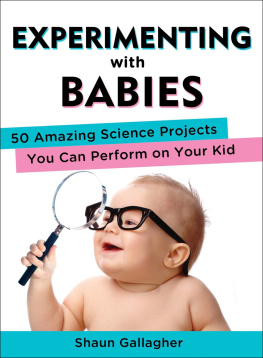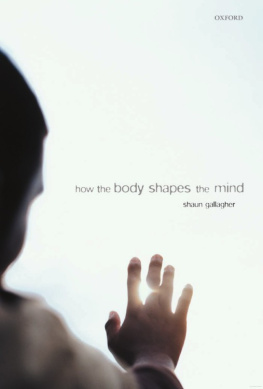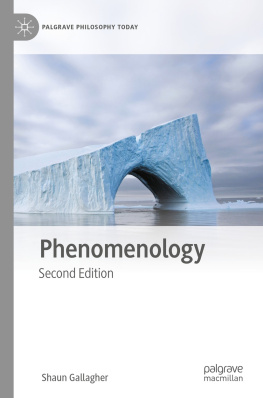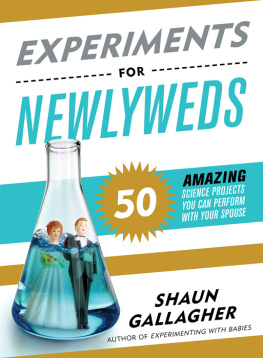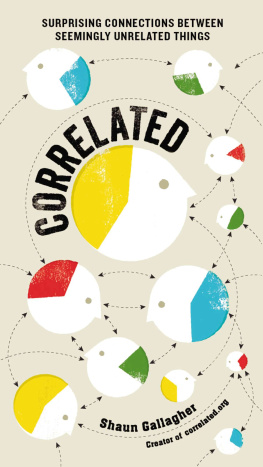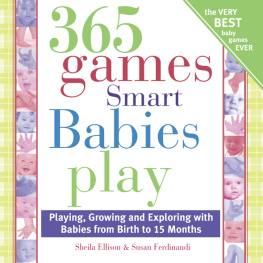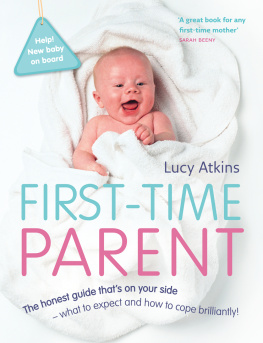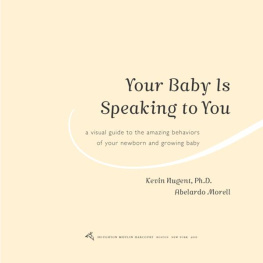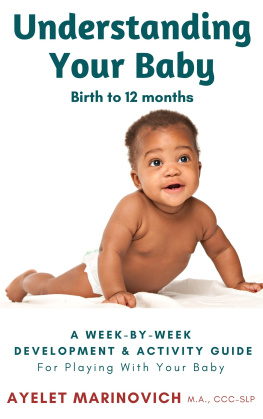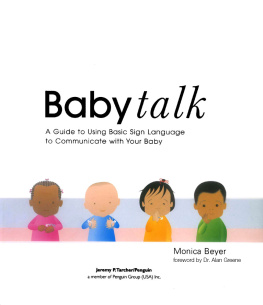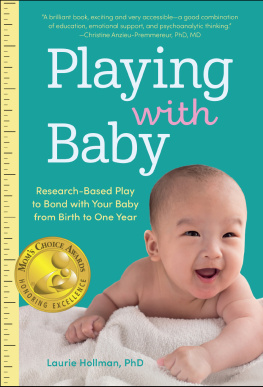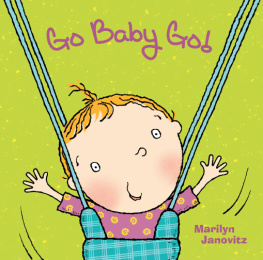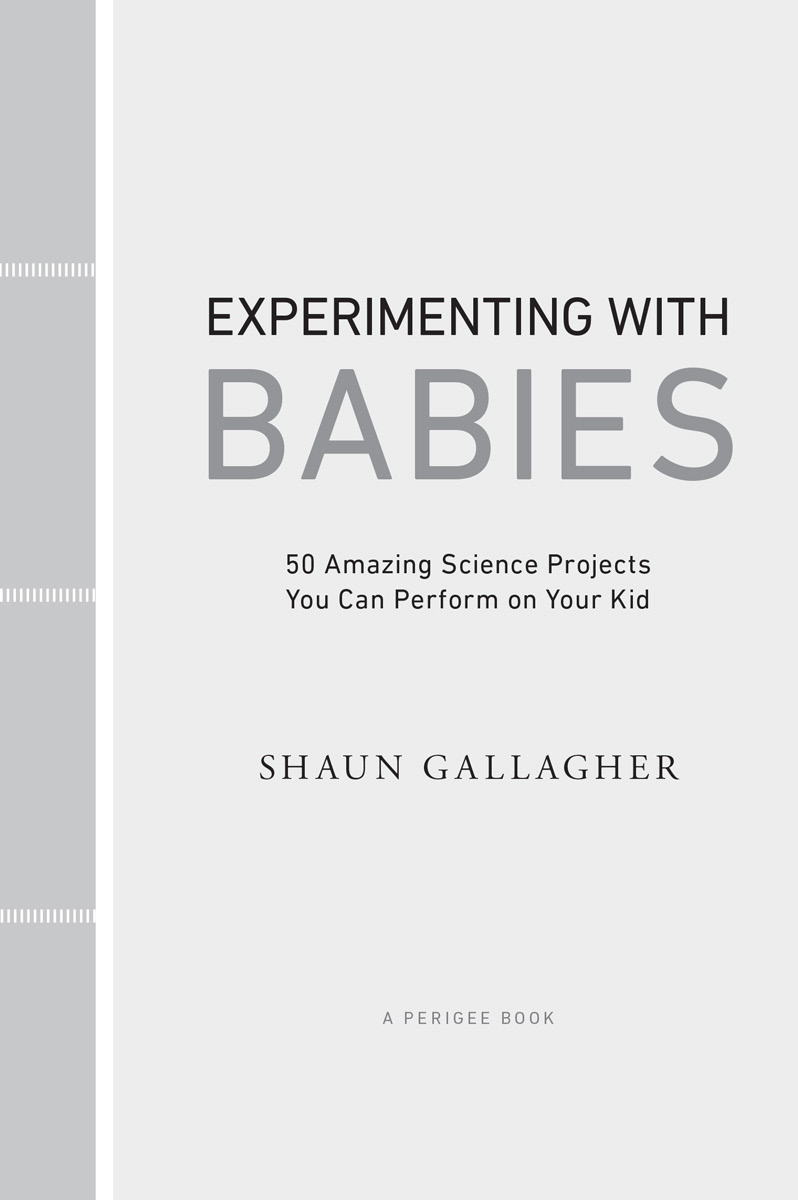ADVANCE PRAISE FOR
Experimenting with Babies
Experimenting with Babies is a wonderful book, giving parents a hands-on way to understand their babys emerging mind. The experiments are easy, fun, and nicely annotated with the real science behind them. What a fabulous way for parents to get to know their new child!
Lise Eliot, PhD, associate professor of neuroscience at the Chicago Medical School of Rosalind Franklin University and author of Whats Going On in There? How the Brain and Mind Develop in the First Five Years of Life
With the marketplace urging parents to buy all manner of things to make their babies smart, Gallaghers book offers parents a view based in science on how much babies really know and figure out on their own. Parents will have fun with this book and gain new respect and awe for their babies amazing capabilities.
Roberta Michnick Golinkoff, PhD, H. Rodney Sharp Professor at the University of Delaware and coauthor of How Babies Talk, Einstein Never Used Flash Cards, and A Mandate for Playful Learning in Preschool
A PERIGEE BOOK
Published by the Penguin Group
Penguin Group (USA) LLC
375 Hudson Street, New York, New York 10014

USA | Canada | UK | Ireland | Australia | New Zealand | India | South Africa | China
penguin.com
A Penguin Random House Company
Copyright 2013 by Shaun Gallagher
Penguin supports copyright. Copyright fuels creativity, encourages diverse voices, promotes free speech, and creates a vibrant culture. Thank you for buying an authorized edition of this book and for complying with copyright laws by not reproducing, scanning, or distributing any part of it in any form without permission. You are supporting writers and allowing Penguin to continue to publish books for every reader.
PERIGEE is a registered trademark of Penguin Group (USA) LLC.
The P design is a trademark belonging to Penguin Group (USA) LLC.
eBook ISBN: 978-1-101-59969-3
Library of Congress Cataloging-in-Publication Data
Gallagher, Shaun, 1948
Experimenting with babies : 50 amazing science projects you can perform on your kid / Shaun Gallagher.
pages cm
Includes bibliographical references.
ISBN 978-0-399-16246-6 (pbk.)
1. Parent and child. I. Title.
HQ755.8.G346 2013
306.874dc23 2013021018
First edition: October 2013
A portion of the authors royalty earnings will be donated to Show Hope, a nonprofit organization that offers adoption grants to families and medical care to orphans around the world. Learn more at ShowHope.org.
While the author has made every effort to provide accurate telephone numbers, Internet addresses, and other contact information at the time of publication, neither the publisher nor the author assumes any responsibility for errors, or for changes that occur after publication. Further, the publisher does not have any control over and does not assume any responsibility for author or third-party websites or their content.
Most Perigee books are available at special quantity discounts for bulk purchases for sales promotions, premiums, fund-raising, or educational use. Special books, or book excerpts, can also be created to fit specific needs. For details, write: Special.Markets@us.penguingroup.com.
To my children,
who are my favorite
science projects.
CONTENTS
Age range: 01 month
Age range: 01 month
Age range: 03 months
Age range: 03 months
Age range: 03 months
Age range: 06 months
Age range: 06 months
Age range: 09 months
Age range: 024 months
Age range: 24 months
Age range: 24 months
Age range: 26 months
Age range: 26 months
Age range: 36 months
Age range: 39 months
Age range: 45 months
Age range: 47 months
Age range: 412 months
Age range: About 6 months
Age range: 58 months
Age range: 59 months
Age range: 511 months
Age range: 68 months
Age range: 69 months
Age range: 69 months
Age range: 69 months
Age range: 69 months
Age range: 610 months
Age range: 612 months
Age range: 624 months
Age range: 624 months
Age range: 79 months
Age range: 711 months
Age range: 910 months
Age range: 10 months
Age range: 915 months
Age range: 924 months
Age range: 1012 months
Age range: 1016 months
Age range: 12 months
Age range: 1113 months
Age range: 1315 months
Age range: 1315 months
Age range: 1318 months
Age range: 15 months
Age range: 1420 months
Age range: 1618 months
Age range: 1824 months
Age range: 1923 months
Age range: 24 months
PROJECTS BY COMPLEXITY
PROJECTS BY RESEARCH AREA
Introduction
W hen I was a kid, I begged Santa Claus for a Radio Shack 50-in-1 Electronic Projects Kit. The kit consisted of a circuit board with numerous capacitors, resistors, LEDs, and a buzzer for auditory output. For each project, you would connect various components with wires and then flip a switch and see what happens. It was great fun, and it contributed to my continued interest in science and engineering.
Now that Im a parent, though, Ive outgrown the Radio Shack science kit and moved on to an experimental apparatus of significantly higher complexity: the baby.
My kids are the most fun, intriguing, surprising (and exhausting) research subjects I have ever had the privilege to conduct weird and wacky experiments on. Ive spent hours upon hours trying to figure out the optimal way to hold a baby to get him to fall asleep quicklyonly to discover, as many parents have, that what works for one baby does not work at all for another. Ive tried at least 20 different techniques to get a toddler to eat his peas. (The winner: Please, whatever you do, dont eat your peas.) Ive tracked my babys acquisition of fine motor skills based on how gently he touches my faceit progresses from painful scratching to awkward poking to soft whisker stroking. Ive seen how early babies unique personalities emerge. Even at a few weeks old, you can already sense how their gears are turning by the way they look at you and observe the world around them. And there is something especially fascinating about conducting research on babies, who are themselves conducting experiments all the timewhich typically take the form, What is this thing, and what does it feel like in my mouth?
Before you begin experimenting on your own baby using the projects in this book, its important to be aware of a few caveats:
- The projects in this book are not designed to assess your babys physical or mental health, intelligence, or any other aspect of his motor, cognitive, or behavioral development, nor are they intended to tell you whether your baby is developmentally on schedule or whether he measures up. Rather, theyre intended to demonstrate principles of infant development in a fun, easy-to-digest way. So dont approach these projects as challenges that your baby must complete in order to keep up with the Joneses kid (or the Einsteins).

